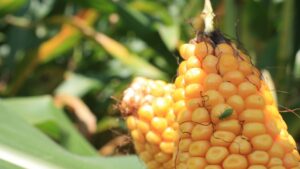People News
Chris Eichhorn has been named a product development manager for Wyffels Hybrids, and is responsible for identifying, testing and managing corn hybrids and seed technology. As part of the company’s research and development group, Eichhorn will plan and coordinate research activities and agronomic experiments. He will also help train the Wyffels Hybrids’ sales force on hybrid characteristics, product placement, new traits and general agronomic information. Prior to joining Wyffels, Eichhorn worked for Monsanto for 12 years as a corn breeder.
Dave Nanda has joined Seed Consultants Inc. as director of genetics and technology. Nanda brings a wealth of knowledge and experience from around the world to the Eastern Corn Belt. Before coming to the United States, he worked with the Rockefeller Foundation in India collecting corn and millets germplasm and also worked closely with Dekalb Seed Operations in Argentina, India and Europe. Throughout his career he has focused on plant breeding, product development and selection.
Becker Underwood Inc. has named industry veteran Michael McFatrich to the newly created position of national sales manager. McFatrich will oversee all sales management responsibilities for biological, seed enhancement, horticultural and specialty products produced and marketed by the company in the United States and Mexico. McFatrich comes to Becker Underwood from Chemtura Corporation, where he recently served as the North American business lead of seed treatments.
Bayer CropScience has established a chief operating officer function to further develop customer-based solutions in its regional crop protection and bioscience operations. Lykele van der Broek, previously head of the Animal Health Division at Bayer Health Care, has taken over the new COO function. At the same time, the Bayer Subgroup has brought its strategy and business management functions together into the newly-named platform Strategy and Business Management headed by Rudiger Scheitza, previously in charge of portfolio management.
Cellectis, a specialist in genome customization, has established a U.S. subsidiary, Cellectis Bioresearch Inc. Located in Cambridge, Mass., Cellectis bioresearch will be responsible for the U.S.-wide promotion of Cellectis bioresearch products and services. Eric Merle will serve as U.S. sales director. Merle’s strong experience in the research tool area in the United States will be a valuable asset in the launch of Cellectis bioresearch Inc.’s operations.
Product News
BASF’s Stamina F3 HL fungicide seed treatment has received United States Environmental Protection Agency registration for commercial seed treatment use on wheat and barley. “Stamina F3 HL provides growers with an excellent seed treatment to help get their wheat and barley seedlings off to the right start by protecting them from key diseases,” says Chris Exton, marketing manager of seed treatments for BASF’s Crop Protection division. The three active ingredients in Stamina F3 HL work together to provide broad-spectrum seed and seedling disease control in wheat and barley.
Afla-Guard, a biological control for the aflatoxin-producing fungi Aspergillus flavus and A. parasiticus in peanuts, can be used on corn as well, according to a study by the U.S. Department of Agriculture scientists who helped develop it. After extensive study and research trials in Texas, Afla- Guard was registered by the U.S. Environmental Protection Agency for use on corn, beginning with the 2009 crop. In corn, Afla-Guard reduced aflatoxins by an average of 85 per cent. This research was published in the September 2010 issue of Agricultural Research magazine.
Fluidigm Corporation has introduced its reusable FR48.48 Dynamic Array integrated fluidic circuit—the world’s first reusable bio-chip for the SNP genotyping market. The FR48.48 Dynamic Array IFC is the first in a line of reusable chip products that will significantly lower costs and enable the use of SNP genotyping in a wide range of applications, including plant and animal biotechnology. The dramatically lower costs and accelerated workflow will provide tremendous economic value, allowing researchers to bring the benefits of molecular breeding, quality control and genetic testing to farmers and consumers.
DNASTAR has released the ArrayStar 4, including QSeq, as an updated microarray and next-gen sequencing technology software suite. The new software includes substantial enhancements to the software’s previously released RNA-Seq capabilities and introduces ChIP-Seq data alignment and analysis. “With this new release, scientists involved with next-gen data now have a complete suite of products at their fingertips,” says Tom Schwei, vice president and general manager of DNASTAR.
Eurofins STA Laboratories in Gilroy, Calif., is now offering accelerated aging vigor tests. The accelerated aging test has been an accepted vigor test method in the seed industry for many years. This test was originally designed to predict the effects of long-term storage on seed lots. Later it was found to be a good indicator of seed vigor. Growers need a way to predict the potential of a seed lot in realistic environmental conditions. The results of the “aged” seed test are compared to the initial standard germ of the same lot. A strong or vigorous seed lot will only suffer a minimal decrease in germination under this stress while a less vigorous or weaker seed lot will have a significant reduction in percent germination. Vigor testing is only appropriate for lots that have been tested for germination and have a good percentage of viable seed.
Business News
Dow AgroSciences LLC is acquiring the assets of the Colorado-based seed company Grand Valley Hybrids. The addition of Grand Valley complements DAS’ Mycogen Seeds brand and its western U.S. silage business. Under the terms of the agreement, DAS will acquire the Grand Valley sales and marketing areas, as well as the administrative services of the business. For the 2010/11 season, Grand Valley will continue to operate under the Grand Valley brand, and customer service will remain at its existing location in Grand Junction.
Dow AgroSciences LLC has entered into a long-term research and product development agreement, focused on the use of Exzact Precision Technology, with KWS SAAT AG. Under the terms of the agreement, DAS will provide KWS with a commercial license option for traits and products developed with EPT in sugar beets, as well as a research license for use in several row crops. EPT provides a versatile and comprehensive toolkit for targeted genome modification in plants. Its demonstrated ability to specifically and efficiently target plant genome sequences delivers an effective means for precise genome engineering and gene stacking.
Bayer CropScience and the Chinese Oil Crops Research Institute have finalized two agreements for oilseed rape research. The parties have agreed to conduct a joint research collaboration related to increasing seed oil content and resistance against fungal diseases caused by Sclerotinia in oilseed rape. The agreements build on a cooperation framework between Bayer and the Chinese Academy of Agricultural Sciences, established in 2008.
Linnaeus Plant Sciences Inc. has entered a licensing agreement with DuPont to use oil gene intellectual property, advanced gene technologies and biotechnology expertise developed by DuPont to accelerate development and commercialization of va
lue-added camelina oil. Camelina, a drought tolerant, non-food oilseed crop, has the potential to reduce global carbon dioxide emissions by offering renewable, bio-degradable feed stocks that can be substituted for petroleum in a variety of applications.
Monsanto Company and AgraQuest Inc. have entered a collaboration to evaluate the potential use of AgraQuest’s pipeline of biopesticide leads to develop seed treatments for Monsanto’s core crops and vegetables. The three-year deal is aimed at developing seed treatment products to control nematodes, disease and insects, and enhance plant growth and yield, using AgraQuest’s collection of microbes. Monsanto will have exclusive rights to the technology for seed treatments in its core crops and vegetables. AgraQuest will retain all rights to the technology for foliar and soil application uses and for use as seed treatments in all other crops.
Bayer Cropscience’s vegetable seed business Nunhems will invest 12 million Euros in the expansion and modernization of its research center in Leudal, the Netherlands. The existing research building will be enlarged to 6,400 square meters and will be equipped with stateof- the-art laboratories for Nunhems’ Biotech Services like DNA analyses as well as for seed technology, cell biology and molecular breeding. The extended and modernized research facilities are scheduled to be fully operational by the end of 2011.
DuPont business Pioneer Hi-Bred and South African-based Pannar Seed Limited have announced an agreement for Pioneer to purchase a majority share of Pannar. The agreement is subject to review by the South African Competition Commission and other countries’ regulatory agencies. Pending regulatory approvals, the deal is expected to close in early 2011. Pannar management, employees, facilities and brands will be retained. Pannar receives access to Pioneer’s genetics library and its corn breeding and biotechnology capabilities, which will benefi t its African operations and its businesses in the United States and Argentina. Pioneer will tap into Pannar’s expertise and reach across Africa and its corn genetics developed specifically for the region.
Chromatin Inc. is extending its research and commercial license agreement with Syngenta Biotechnology Inc. for corn and soybeans for Chromatin’s proprietary gene stacking technology. The agreement furthers a three year relationship between the companies. Under a 2007 agreement, Syngenta obtained non-exclusive rights to use Chromatin’s gene stacking technology for trait genes in corn and soybeans. Chromatin has launched activities to further develop gene stacking technology for soybean applications.
Industry News
A new method for testing gene function in corn plants has been created by United States Department of Agriculture scientists and university cooperators. Peter Balint-Kurti, a geneticist with the USDA’s Agricultural Research Service, teamed up with colleagues Guri Johal and Cliff Weil at Purdue University to create “mutant-assisted gene identifi cation and characterization.” MAGIC is a genecentered approach that uses mutant genes or other genetic variants controlling a trait of interest as “reporters” to identify novel genes and variants for that trait. This method offers researchers a new way of sifting through the large amount of natural genetic variation to identify and map versions of genes important for the control of specific, agriculturally useful traits. Details about MAGIC were recently published in the scientifi c journals Crop Science and Genetics.
The complicated cotton genome is one step closer to having its genetic threads unraveled, thanks to research completed by Monsanto Company and San Diego-based Ilumina Inc. Combining Monsanto’s knowledge of cotton genomics and Illumina’s next generation sequencing technology, the two companies have completed sequencing a wild Peruvian cotton species, Gossypium raimondii, and will donate their findings to the public. The completion of G. raimondii will aid public and private researchers in their quest to sequence the more elusive genome of domesticated cotton, G. hirsutum, which could lead to the development of cotton crops with higher yields, better fiber quality and greater resistance to diseases and pests.
A University of Missouri research team has developed a soybean that produces oil naturally low in saturated and trans fats. “When we started this research, we were looking at three factors,” says Kristin Bilyeu, a researcher with the USDA Agriculture Research Service at the College of Agriculture, Food and Natural Resources at MU. Through natural pollination procedures, Bilyeu and Grover Shannon, professor of plant sciences at MU, developed a soybean oil very high in oleic acid, which not only stabilized the oil, but also made it healthier. The natural breeding increased oleic acid in the bean from 20 per cent to 80 per cent and decreased the amount of saturated fat in the oil by 25 per cent. The next step of the research is determining whether this soybean will produce economically viable yields in different environments. The study is being published in BMC Plant Biology.
The Black Sea Biotechnology Association has recently published a book titled, Regional Consensus Document on Environmental Risk and Economic Assessment of Genetically Modifi ed Crops. Case Studies: Soybean, Maize, Sugar Beet. Reducing the Harmful Impacts of Plum Pox Virus through the Use of Biotechnology. The book is the first attempt to analyze simultaneously environmental and economic impacts of GM staple crops on the common regional basis, and was prepared by BSBA with the use of regional data and experience of growing these crops in the countries belonging to the Black Sea region.
Evidence from a pilot study led by food scientists at Florida State University suggests that watermelon can be an effective natural weapon against prehypertension, a precursor to cardiovascular disease. It is the first investigation of its kind in humans. FSU assistant professor Arturo Figueroa and professor Bahram Arjmandi found that when six grams of the amino acids L- aitrulline/Larginine from watermelon extract were administered daily for six weeks, there was improved arterial function and consequently lowered aortic blood pressure in all nine of their prehypertensive subjects (four men and five postmenopausal women, ages 51-57).












